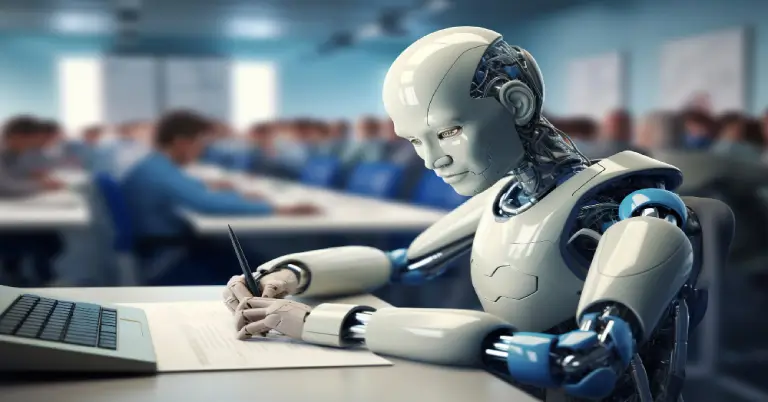Businesses are always adapting to work smarter, not harder. That’s why DevOps was invented in the first place—to create a bridge between development and operations to promote smooth processes and increase efficiency. As the technological evolution continues, DevOps evolves with it.
When AI is implemented into the functionality of , teams find new ways to automate tedious tasks, make sharper decisions, and fine-tune operations like never before. This combo is nothing short of revolutionary for IT operations.
DevOps and AI: A Perfect Pair
DevOps and AI share a common goal: making things run smoother and faster with little to no hindrance and minimal intervention. DevOps focuses on eliminating the division between development and operations teams, speeding up the delivery of high-quality software. AI brings innovative solutions to the table with its data-driven insights and machine-learning capabilities.
When you implement these two together, you get a system that’s not just efficient but also smart. It can predict issues before they happen, handle routine tasks automatically, and continuously improve based on past experiences. This is where AI starts to level up DevOps, pushing the boundaries of what’s possible in IT.
Automating the Boring Stuff
One of the biggest advantages of AI in DevOps is its ability to take over the boring, repetitive tasks that used to take a lot of time. Traditionally, things like system monitoring, deployments, and configuration management required a lot of manual effort, which wasn’t just time-consuming—it was also prone to human error.
Now, AI-driven tools can step in and handle these tasks automatically. This frees up DevOps teams to focus on the bigger picture, like strategizing and innovating. For example, AI can monitor systems 24/7, catching and fixing issues in real time without anyone having to lift a finger. This not only cuts down on downtime but also keeps systems running smoothly around the clock.
AI makes deployments less risky, it analyzes data and current conditions and predicts whether a deployment is likely to succeed or not. This reduces the chance of deployment failures and ensures that new features and updates roll out quickly and reliably.
Supercharging CI/CD with AI
Continuous Integration and Continuous Deployment (CI/CD) are core to DevOps, allowing teams to push out updates more frequently and fluidly. AI can improve these processes by optimizing the entire CI/CD pipeline.
AI scans your codebase for potential bugs or vulnerabilities before they’re merged, helping to catch issues early and reduce the time spent on debugging. It can also predict how code changes might impact system performance or user experience, giving teams the insights they need to make informed decisions about whether to deploy or tweak further.
AI-driven tools can prioritize which tests to run based on their importance and likelihood of catching critical issues. This speeds up the testing process and helps ensure that the most important tests get the attention they deserve.

Predictive Analytics: Staying Ahead of Problems
Through its predictive analytics abilities, AI transforms DevOps,
As it extracts data from logs, metrics, and other sources, spots patterns and trends that might indicate potential problems before they happen.
AI can also predict when a server is likely to fail based on its past performance and current status. This allows teams to take preventative measures, like scaling resources or applying patches, to avoid failure altogether.
AI also predicts traffic surges, enabling teams to scale infrastructure accordingly. This means your systems can handle whatever comes their way without wasting resources on over-provisioning.
And when it comes to security, AI can be a game-changer. It can monitor network traffic and user behavior to detect potential threats, like unauthorized access or data breaches, and alert teams before things get out of hand.
Better Collaboration and Decision-Making
Teamwork and communication are crucial for DevOps.
AI-driven dashboards can give teams a real-time view of project status, highlighting areas that need attention and suggesting actions to take. This keeps everyone on the same page and helps teams make smarter decisions based on up-to-the-minute data.
AI also automates routine updates and notifications, streamlining communication between team members. Imagine an AI-driven chatbot automatically notifying the team when a build is complete, a deployment is successful, or an issue is resolved. This reduces the need for manual updates and ensures that everyone stays in the loop.
Plus, AI can help with decision-making by analyzing data from past projects and offering recommendations on what to do next.
AI-Driven Testing and Quality Assurance
Testing and quality assurance (QA) are essential parts of software development, but they are also time-consuming.
AI-driven testing tools can automatically generate test cases, ensuring that all possible scenarios are covered. This saves time on manual test creation and improves the accuracy and coverage of tests.
AI can also analyze test results to spot patterns that might indicate underlying issues. For instance, if a particular test keeps failing under certain conditions, AI can flag this for further investigation.
And when it comes to test execution, AI can prioritize the most important tests first, speeding up the process and reducing the time it takes to roll out updates.
Continuous Improvement with Machine Learning
Machine learning, a key part of AI, allows systems to learn from data and get better over time. In DevOps, this means continuous improvement.
For example, machine learning algorithms can analyze data from previous deployments to figure out what worked and what didn’t. This knowledge can then be used to optimize future deployments, reducing the risk of failure and improving overall reliability.
Machine learning can also enhance monitoring and alerting. By learning what “normal” looks like for a system, these algorithms can detect anomalies that might signal a problem. This cuts down on false alarms and ensures that teams are only alerted to issues that need attention.
And when it comes to resource allocation, machine learning can predict future demand and automatically adjust resources to match. This keeps systems running efficiently and cost-effectively.
Challenges and Things to Keep in Mind
While AI offers a ton of benefits for DevOps, it’s not without its challenges. AI systems can be complex, requiring a deep understanding of both AI and DevOps to implement and maintain effectively.
Data quality is another concern. AI relies on accurate, complete, and up-to-date data to function well. Ensuring that your data meets these standards is crucial to getting the most out of AI.
There are also ethical considerations to think about. As AI takes on more tasks, there’s a risk of bias in decision-making, as well as concerns about job displacement. Companies need to use AI responsibly and consider the broader impact of its use.
Read More:
What’s Next for DevOps and AI?
Shortly, we can expect even more advanced AI-driven tools and processes that further automate and optimize DevOps practices. This will allow businesses to deliver software faster, more reliably, and with fewer resources.
One exciting possibility is the development of AI-driven self-healing systems that can detect and fix issues automatically without any human intervention. This would mark a huge leap forward in IT efficiency and reliability.
Another area to watch is how AI-driven DevOps might enable more personalized customer experiences. By analyzing customer data and behavior, AI could help DevOps teams introduce features and updates that are according to individual users’ needs and preferences.
Wrapping Up
AI is reshaping DevOps in a big way. By taking over routine tasks, improving CI/CD, providing predictive insights, and improving collaboration, AI helps DevOps teams work more efficiently and effectively. But it’s not all smooth sailing—there are challenges to navigate and ethical considerations to remember. As AI technology advances, its role in DevOps will expand, opening up new possibilities for innovation and improvement. The future of DevOps, powered by AI, is bright and full of potential.
FAQs
Q1: How does DevOps use AI?
DevOps teams use AI to automate tasks like code testing, deployment, and infrastructure management, speeding up workflows. AI helps predict system issues, detects anomalies for faster incident response, and strengthens security by identifying vulnerabilities. This allows DevOps to deliver more efficient, reliable, and secure software.
Q2: Which AI tool is best for DevOps engineers?
These are the AI tools best for DevOps engineering:
- CodeGuru.
- StackRox.
- Copilot.
- Sysdig.
- PagerDuty.
- Atlassian Intelligence.
- Bright.
- Dynatrace
- Splunk
- Harness
Q3: What is the role of gen AI in DevOps?
For DevOps, Generative AI automates repetitive tasks in software development and deployment, such as code testing, deployment, and monitoring. It also analyzes historical data to predict potential issues in the process.
Q4: Does DevOps use machine learning?
Predictive DevOps relies on the ongoing collection, processing, and analysis of large volumes of operational data, from system logs to user interactions. At its core are machine learning models, trained on historical data, that provide valuable predictions.
Q5: Can AI replace DevOps?
AI boosts automation by making it more responsive and adaptive, allowing systems to analyze historical data, learn from patterns, predict outcomes, and offer insights that enhance DevOps workflows. Rather than replacing DevOps, AI is transforming and evolving its processes for greater efficiency and optimization.











